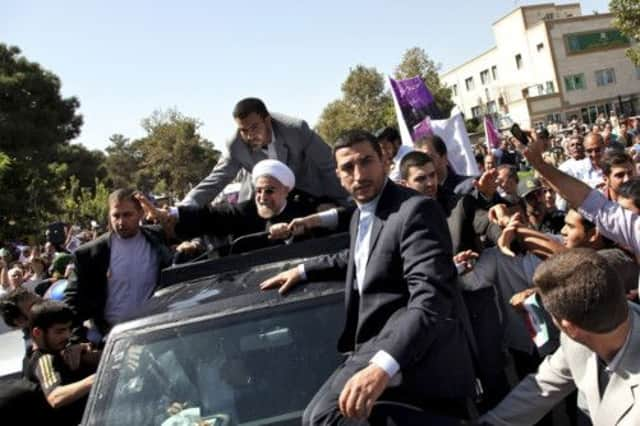Iran seeks to appease over US diplomatic exchange


The comments by deputy foreign minister Abbas Araghchi appeared tailored to address Iranian factions, including the powerful Revolutionary Guard, that have grown uneasy over the pace of diplomacy last week between the White House and president Hassan Rouhani, which was capped by a 15-minute call with president Barack Obama.
“Definitely, a history of high tensions between Tehran and Washington will not go back to normal relations due to a phonecall, meeting or negotiation,” Mr Araghchi was quoted by the semi-official Far news agency as saying.
Advertisement
Hide AdAdvertisement
Hide AdMr Rouhani is seeking to restart stalled talks over its nuclear programme in the hopes of easing US-led sanctions.
Mr Araghchi also reiterated statements by Iran’s Supreme Leader, Ayatollah Ali Khamenei, who said he no longer opposes direct talks with Washington but is not optimistic about the potential outcome. The Ayatollah appears to have given Mr Rouhani authority to handle the nuclear talks with world powers, scheduled to resume in Geneva in two weeks, and seek possible broader contacts with the Obama administration.
“We never trust America 100 per cent,” said Mr Araghchi. “And, in the future, we will remain on the same path. We will never trust them 100 per cent.”
The divisions over Mr Rouhani’s overtures were on display on Saturday, when he returned from New York. Supporters welcomed him with cheers, but a smaller pocket of protesters shouted insults.
The US and Iran broke ties after the 1979 Islamic Revolution when mobs stormed the US embassy in Tehran and 52 hostages were held for 444 days.
Hard-line lawmaker Hamid Rasaei criticised the phone call as “breaking the resistance brand” of Iran – a reference to the self-promoted idea that Iran is the anchor for opposition to Israel and Western influence in the region.
He said acceptance of Mr Obama’s phone call by Mr Rouhani was “undignified”.
“You converted a win-lose game to a win-win one” for the US, he said during a parliamentary session yesterday.
Advertisement
Hide AdAdvertisement
Hide AdThe core of the opposition to Mr Rouhani appears built around supporters of former president Mahmoud Ahmadinejad, who once sent a letter to then president George Bush in an attempt to open dialogue.
Mr Ahmadinejad apparently was rebuffed by Mr Bush, and the former president later fell from favour with the Ayatollah after trying to challenge his authority.
The Ayatollah’s presumed nod to Mr Rouhani to test outreach with Washington may be seen by Mr Ahmadinejad’s backers as another rebuff.
Mr Ahmadinejad’s first public comments on the Obama phone call carried a noncommittal tone. “I don’t know, maybe it was the right thing to do,” the conservative Baztab news website reported his saying yesterday.
Israeli prime minister Benjamin Netanyahu is travelling to the US this week for a trip aimed at casting doubt on Iran’s recent overtures to the West.
Mr Netanyahu will visit the White House today and address the UN General Assembly tomorrow.